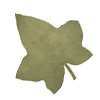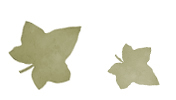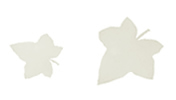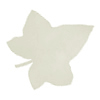|
Yarrow
- Achillea
millefolium
The
erect stem of the perennial yarrow, which grows
up to a metre tall, is covered in soft hairs, and
bears numerous white or pink flowers arranged in
a flat-topped corymbs - the flower stalks do not
all join at one point. Flowers throughout summer
and autumn. The leaves are fern like, finely dissected,
about 5 -15cm in length, and lacy in appearance.
Can be found growing in grass and waste land.
Used in divination, prediction and folk rituals
for thousands of years, yarrow stalks are still
used today in the i-ching. In East Anglia, as late
as the 1900s, Yarrow was credited with the power
to avert sickness and protect from spells, and was
scattered over doorsteps on Midsummer’s Eve.
Traditionally
used as a styptic, a folk remedy for nose bleeds
suggests inserting a couple of the feathery fresh
leaves into the nostril to provide ‘ideal encouragement
for clotting’ - a slightly more comfortable solution
might be to soak some cotton wool in a yarrow infusion
and then use this to plug the nostrils. (A folk
name of Yarrow is in fact ‘nose bleed’).
Also
known as “soldier’s woundwort,” its use in the treatment
of wounds is said to go back to Achilles, who was
reported to use it as a salve for soldiers injuries
in the Trojan war. The American Indians have since
used it similarly.
Antiseptic
to the urinary tract, Yarrow also increases urination,
and helps clear wind and indigestion, as well as
relaxing peripheral blood vessels, and can help
to reduce high blood pressure. It is also cooling
in fevers.
The
anti-allergenic compounds in Yarrow are activated
by hot water and steam - Yarrow tea can be helpful
for coughs, flu, hay fever, and catarrh, and a steam
inhalation of the flowers will help relieve sinusitis
pain. The tea is also useful in soothing menstrual
cramps, and will check excessive bleeding.
Yarrow
contains chamazulenes, which are soothing and anti-inflammatory,
and the oil can be used in a chest rub for colds
or catarrh. The oil can be used in a range of skin
care treatments : acne, rashes, eczema, wounds,
cuts, scars, burns... to name a few, and helps tone
the skin. It can also be used as a hair rinse to
promote hair growth.
!
Avoid in high doses in pregnancy - Yarrow is a uterine
stimulant. The fresh herb can cause dermatitis -
and in rare cases, prolonged use may increase skin
photosensitivity ! |











